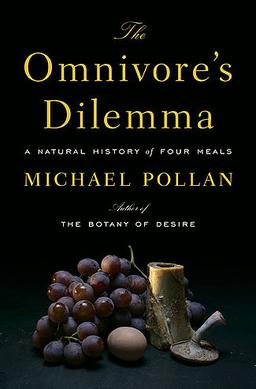The Omnivore's Dilemma
The Omnivore's Dilemma: A Natural History of Four Meals is a non-fiction book written by American author Michael Pollan, published in 2006. The book explores the question of what we should have for dinner, given the wide variety of food choices available to consumers in the modern world. Pollan approaches the dilemma from an ecological and ethical perspective, examining the paths that food can take from the earth to our plates. The book is divided into three parts, each focusing on a different food chain: industrial, organic, and personal, culminating in a meal prepared by the author himself.
Summary[edit | edit source]
The Omnivore's Dilemma delves into the complexities of the food industry, tracing the origins of the food we consume. Pollan investigates the industrial food chain, which is largely based on corn and soybeans, and reveals the environmental and health impacts of this system. He then explores the organic food movement, including both large-scale operations and small, diversified farms, to assess their sustainability and ethics. Finally, Pollan turns to the personal food chain, foraging and hunting to gather the ingredients for a meal. Throughout the book, Pollan emphasizes the importance of understanding where our food comes from and the consequences of our eating habits.
Themes[edit | edit source]
The book touches on several major themes, including sustainability, the ethics of eating, and the connection between human health and the environment. Pollan argues that the choices consumers make about what to eat have profound implications for the health of the planet and ourselves. He advocates for a deeper awareness of the food system and encourages readers to consider more sustainable and ethical eating practices.
Reception[edit | edit source]
The Omnivore's Dilemma has been highly influential, sparking widespread discussion about food politics and the modern diet. It received critical acclaim for its insightful analysis and engaging narrative. The book has been recognized as a pivotal work in the food movement, inspiring readers to think more critically about their dietary choices and the food system.
Impact[edit | edit source]
Pollan's work has contributed significantly to the conversation about sustainable agriculture, the locavore movement, and the critique of industrial food production. It has influenced both public opinion and policy discussions regarding food safety, nutrition, and environmental sustainability. The book is often cited in debates about food ethics, climate change, and the future of agriculture.
See Also[edit | edit source]
Search WikiMD
Ad.Tired of being Overweight? Try W8MD's physician weight loss program.
Semaglutide (Ozempic / Wegovy and Tirzepatide (Mounjaro / Zepbound) available.
Advertise on WikiMD
|
WikiMD's Wellness Encyclopedia |
| Let Food Be Thy Medicine Medicine Thy Food - Hippocrates |
Translate this page: - East Asian
中文,
日本,
한국어,
South Asian
हिन्दी,
தமிழ்,
తెలుగు,
Urdu,
ಕನ್ನಡ,
Southeast Asian
Indonesian,
Vietnamese,
Thai,
မြန်မာဘာသာ,
বাংলা
European
español,
Deutsch,
français,
Greek,
português do Brasil,
polski,
română,
русский,
Nederlands,
norsk,
svenska,
suomi,
Italian
Middle Eastern & African
عربى,
Turkish,
Persian,
Hebrew,
Afrikaans,
isiZulu,
Kiswahili,
Other
Bulgarian,
Hungarian,
Czech,
Swedish,
മലയാളം,
मराठी,
ਪੰਜਾਬੀ,
ગુજરાતી,
Portuguese,
Ukrainian
Medical Disclaimer: WikiMD is not a substitute for professional medical advice. The information on WikiMD is provided as an information resource only, may be incorrect, outdated or misleading, and is not to be used or relied on for any diagnostic or treatment purposes. Please consult your health care provider before making any healthcare decisions or for guidance about a specific medical condition. WikiMD expressly disclaims responsibility, and shall have no liability, for any damages, loss, injury, or liability whatsoever suffered as a result of your reliance on the information contained in this site. By visiting this site you agree to the foregoing terms and conditions, which may from time to time be changed or supplemented by WikiMD. If you do not agree to the foregoing terms and conditions, you should not enter or use this site. See full disclaimer.
Credits:Most images are courtesy of Wikimedia commons, and templates, categories Wikipedia, licensed under CC BY SA or similar.
Contributors: Prab R. Tumpati, MD

